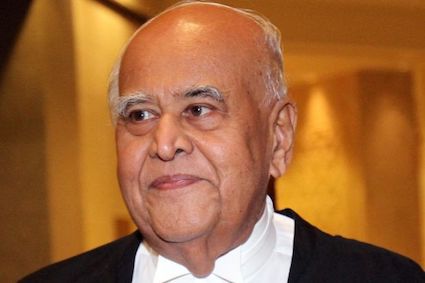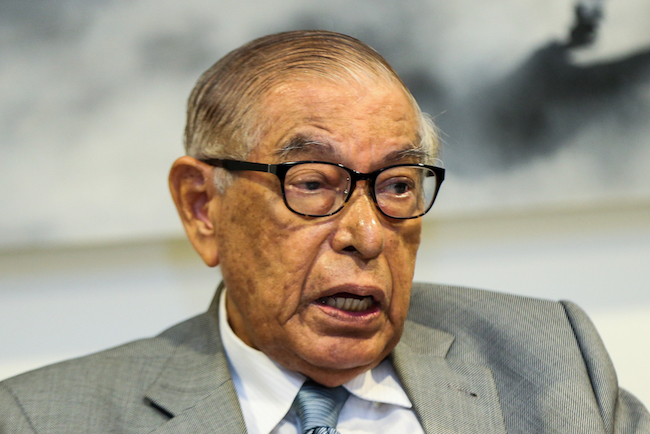Gopal Sri Ram: putting the lunatic in charge of running the asylum

V.K. Lingam and Gopal Sri Ram are two infamous case-fixers and judge-fixers. But they are not the only two. Since 1996, many judges have also come forward to reveal the rot and corruption in Malaysia’s judiciary. And putting Gopal Sri Ram in charge of the prosecution is like putting the lunatic in charge of running the asylum.
NO HOLDS BARRED
Raja Petra Kamarudin

The country should make reparations and restore justice and honour to former High Court judge Datuk Syed Ahmad Idid Syed Abdullah Idid, the country’s first judicial whistleblower who was victimized and punished instead of being rewarded for his act of supreme loyalty to his oath of office as a judge.
If Syed Ahmad Idid’s whistleblowing in March 1996 had been heeded, resulting in thorough investigations and root-and-branch reform of the judiciary 19 years ago, Malaysian judges, lawyers and citizens would have been able to stand tall in the world today because we would have a judiciary nationally and internationally respected for its independence, integrity and quality! (Lim Kit Siang, 5 March 2015: READ MORE HERE)
*****************************************************
READ HERE: Hamid Sultan’s 65-page affidavit filed in support of an application by Sangeet Kaur Deo, was to declare that the chief justice had failed to defend the integrity of the judiciary in two cases. He even called for the removal of the chief justice.
*****************************************************
A flurry of questions about Malaysian justice
By Roger Mitton, Asia Now, November 2000
THE MALAYSIAN JUDICIARY IS in a state of crisis. In the recent past, several court decisions have provoked allegations of interference. Government leaders felt obliged to try to quell the unease; Prime Minister Mahathir Mohamad himself cautioned judges about associating with businessmen. On July 1, in an unprecedented move, a High Court justice, Syed Ahmad Idid, resigned after publishing a 33-page pamphlet accusing colleagues on the country’s highest benches of corruption, abuse of power and personal misconduct.
Last week Attorney-General Mohtar Abdullah revealed that police and the Anti-Corruption Agency had questioned 12 top judges, including Chief Justice Eusoff Chin, and had examined their assets in light of the pamphlet. It contained 112 allegations: 39 charges of corruption, 21 of abuse of power, and 52 of misconduct, immorality or other indiscretions. There were claims of payments of RM 50,000 ($20,000), with recipients graduating to taking millions from named business entities.
The AG said police found the judges clean; he described the accusations against them as “highly seditious, defamatory and derisive.” But he was not prosecuting Idid, whom he did not name in his statement. The judge’s resignation, Mohtar explained, was sufficient punishment. The matter was closed, he added: “I hope the integrity and impartiality of the judiciary will not be doubted henceforth.” Chief Justice Eusoff echoed the AG’s position.
No dice. The government-aligned domestic media, including the influential vernacular press, carried comments critical of the AG’s handling of the matter. Some critics saw it as an attempt to skirt the concerns raised by Idid. “The judiciary must be clean — and must be seen to be clean,” said government MP Fauzi Rahman. “I’m glad the CJ says it is clean. On whether it is seen to be clean, I don’t want to comment.” Lawyer and legislator Khaled Nordin, also of the dominant UMNO party, declared: “To sweep things under the carpet like this will only make matters worse.” Opposition leader Lim Kit Siang added: “The public reaction has been one of widespread disbelief and dismay. It has not restored confidence in the judiciary, but has further undermined it.”
Of the ex-justice’s charges, Lim says: “We want to see how they are found to be untrue. Idid is generally respected by the bar, so the question is: why did he feel impelled to author such a pamphlet?” Mohtar said the judge made a full statement explaining his reasons, but that it could not be made public. In parliament, a request by Lim for an emergency debate on the accusations against the judiciary was rejected. For its part, the Bar Council called for an urgent “independent Royal Commission to look into the administration of justice and propose, if need be, radical reform.” Mahathir said there was no need for a further inquiry since the allegations had been found to be false.
The issue, however, continues to reverberate in the legal fraternity. Bar Council chairman Hendon Mohamed says: “We have always believed [the pamphlet] was the work of more than one person.” Idid, asserts lawyer and opposition MP Karpal Singh, “is just the fall guy. Obviously, he was pressured to resign.” The judge has vanished; his family says he has gone abroad, the local press reports that he left for London on July 2.
“Poison-pen letters” are common in Malaysia and tend to be quickly — and rightly — dismissed as malicious nonsense. But Idid’s missive was different. Like some epistolary neutron bomb, its shock waves are still causing casualties, partly because it appeared amid mounting concern over some judges. Malaysian lawyer Param Cumaraswamy, who is also the U.N. Special Rapporteur on the Independence of Judges and Lawyers, says: “There was already public disquiet about the judiciary well before this letter.”
The concern arose over several judgments, culminating in the Ayer Molek Rubber Co. share dispute. In that complex commercial case, the second-ranked Court of Appeal called a lower court’s decision “an injustice perpetrated by a court of law.” But the nation’s highest bench, the Federal Court, overruled the appeal chamber and berated it for “bringing the administration of justice into disrepute.”
Mahathir pacified the quarrel, but the damage was done. “The affair badly affected public confidence in the judiciary,” says former MP and lawyer Wee Choo Keong. Param adds, echoing others in the legal profession: “That case brought to the surface allegations about some business quarters influencing the system of justice.”
Matters cooled off briefly — until Idid’s pamphlet appeared. Judicial practice seems set to remain a big issue despite the AG’s statement clearing the 12 judges. A flurry of defamation charges made by tycoon Vincent Tan and lawyer V.K. Lingam (both named in Idid’s pamphlet and involved in the Ayer Molek case) will further stir the controversy. The two are suing, among others, a senior member of the bar, Tommy Thomas, and a leading law firm, Skrine & Co.
If these allegations reach court, they may again call into question the decision not to prosecute Idid. Statements cited in the defamation charges, which claim $144 million in damages, appear less inflammatory than those in the judge’s pamphlet. For his part, Idid told Asiaweek he may write a book about the whole affair.
*****************************************************
Ex-top judge’s disclosure vindicates whistleblower
Hafiz Yatim, 5 March 2015
EXCLUSIVE Following recent revelations by former Court of Appeal judge KC Vohrah of questionable actions by ex-chief justice Eusoff Chin, the man who had first revealed judicial corruption in Malaysia feels quietly vindicated.
Syed Ahmad Idid Syed Abdullah Idid was the High Court judge who was forced to resign for writing an anonymous letter exposing the matter in 1996, which was sent to a select set of high officials.
Among its allegations, it revealed Eusoff had gone on a New Zealand holiday with VK Lingam, a senior lawyer who appeared before the then chief justice in court on a number of cases.
Pictures of the duo taken together with their families underscored their close ties.
It resulted in Syed Ahmad Idid being told to resign when the letter he sent mysteriously found its way into some government departments and then spread to the media.
Syed Ahmad Idid’s immediate reaction to Malaysiakini’s article on Vohrah was elation – that the former Court of Appeal judge had written on the matter and he was certain other judges could also tell of similar experiences.
Among other transgressions, the Ayer Molek case that Vohrah referred to was filed in the Special and Appellate Powers Division whereas it should have been in the Commercial Division.
Syed Ahmad Idid also recalled a similar incident as a Kuala Lumpur High Court judge with the Commercial Division from 1995 to 1996.
According to him, a case involving a sum of a quarter of a billion ringgit was correctly filed in the Commercial Division before him. But before it could be called in open court, the file was wrested away by Eusoff.
“That matter was given to another judge who now resides, and must be enjoying life, in Europe,” he quipped.
Appalled at corruption
Syed Ahmad Idid was a former assistant director with the Royal Customs and Excise Department before he left to read law in the Inner Temple London. He was legal director of a bank before being appointed a High Court judge in 1990.
In 1996, appalled at the corruption and dubious practices in the corridors of justice, he turned whistleblower.
He remembers that his anonymous complaint over misconduct in the judiciary, especially on the then lord president and CJ, Eusoff Chin ( right ), was sent to a few top government officers whose duties he hoped included enhancing the standards of performance in the government and protecting the integrity of the country.
Unfortunately someone in a department had disseminated it to the media, along with a ‘covering note’.
“The aim was to frame me. The then attorney-general (the late Mohtar Abdullah) – a reader of English fiction – described this as a ‘poison pen’ letter.”
Somehow the letter was traced back to him and he was given two options – to resign honourably or be detained, possibly under the Internal Security Act.
A senior official, representing the AG, had met him armed with the offer, revealed Syed Ahmad Idid.
He said Mohtar was seen as overly enthusiastic to kill the ‘poison pen’ letter writer rather than investigating the allegations made against Eusoff. “He went to the press as though he was out for revenge.”
Queried why he did not fight back, Syed Ahmad Idid said as a judge he could not join the political fray.
“I had no political party and so no political pull or push. The press jumped in and wrote all sorts of things against me.
“A reporter wrote I had escaped to London. In reality, I was eating ‘nasi lemak’ right here in Section 21, Petaling Jaya.
“Even a professor took advantage by writing about people who wrote poison-pen letters. So the lies mounted. But the newspapers which printed the lies paid dearly through their falling sales,” the former judge said.
Threat of imprisonment
Asked as to why he did not take legal action, Syed Ahmad Idid said he was threatened with imprisonment.
“I had a heart attack the previous year. Naturally I was fearful I could not survive the ordeal of a prison or even a lock-up stay. Also I had no savings to engage counsel and had no hope for the ‘justice that money can buy’.
“So you see my predicament. I made ‘doa’ and learnt that discretion is the better part of valour.”
Syed Ahmad Idid added he believed then prime minister Dr Mahathir Mohamad relied a lot on his advisers and as Mohtar held the reins, the PM had no alternative but to believe what the AG told him.
“I did not contact the former AG or the former IGP. Both knew my complaints were not investigated. On the contrary, I, the complainant, was punished.
“Thankfully, I have genuine friends both in the government, the courts and also the private sector who support me a lot, (and) I am grateful. Naturally I wish they can get Umno to push for remedial action in my favour. However I guess Umno is busy with so many issues.”
Lingam was later implicated in a video showing him having a phone conversation with then Chief Judge of Malaya Ahmad Fairuz Sheikh Halim in 2001 over the fixing of judges.
This eventually led to a royal commission of inquiry in 2008 to investigate the issue.
The five-member panel proposed action be taken on Lingam, Eusoff and four others including Mahathir.
However until today, no action has been taken against any of the six.
“After the Lingam inquiry, there should have been “korek, korek and korek” (dig, dig and dig) for more truths,” Syed Ahmad Idid sighed in dejection, playing on the now legendary Lingam’s “correct, correct, correct” quote that was caught on the video.
However in a manner of speaking, Syed Ahmad Idid had the last laugh. He received many calls and text messages congratulating him on being vindicated for the revelations he made more than a decade before the infamous video was made public.
Compensation received
He has also seen former lord president Salleh Abas and five other Supreme Court judges being compensated in 2008.
In 1988, following the Umno debacle in which the party was declared illegal by the court, Salleh and other Supreme Court judges were forced to resign.
Two decades later the government under Abdullah Ahmad Badawi decided the judges were hard done by, and granted compensation and returned their pensions.
Syed Ahmad Idid now hopes the government will similarly look into the injustice done to him.
“I hope the government would remedy the wrong done to me…,” he said, stressing that he had sent his 1996 complaint to a few top government officials but did not however make it public.
“In fact, a professional forensics expert could easily confirm that the typeset, font and paper of that covering note and the attachment could not have come from me but from a department over which I had no control.”
Syed Ahmad Idid’s only regret was that he had been perceived to be an opposition sympathiser after the late Karpal Singh spoke well of him in Parliament when news of his resignation became public and again in 2006.
This, he said, had resulted in some within the government branding him as an opposition supporter. According to Syed Ahmad Idid, he was informed of this by a former cabinet minister.
“I was denied any form of support. How more injudicious can the country get,” he said.
Despite this, Syed Ahmad Idid is glad that current judges, especially those appointed by the Judicial Appointments Commission, are of quality, possessing experience and qualifications.
“This is essential in persons chosen to administer justice. A few may be young or ‘belum masak’ (not mature). But so long as they gather knowledge day by day and are fiercely honest and impartial, our judiciary will move a long way from the Eusoff Chin regime,” he remarked,
After his premature end in government service, Syed Ahmad Idid has kept himself busy with visits to the Inner Temple, his alma mater, and the International Court of Justice in The Hague as well as studying the plight of Muslims in Mindanao.
He has written extensively on the negotiations between Manila and Moro Islamic Liberation Front (MILF) and on basic law.
In addition to speaking at arbitration conferences overseas, Syed Ahmad Idid has participated in the United Nations Commission on International Trade Law (Uncitral) meetings in New York and Vienna.
In 2012, Syed Ahmad Idid wrote a book titled ‘Writing of Judgments: A Practical Guide for Courts and Tribunals’.



